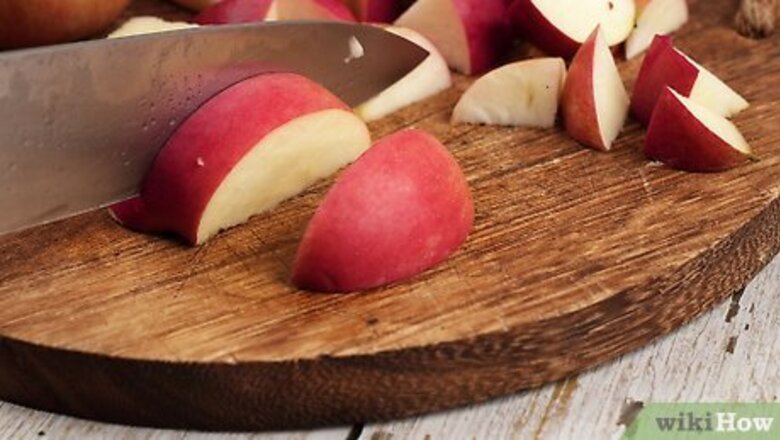
views
Blanching the Fruit
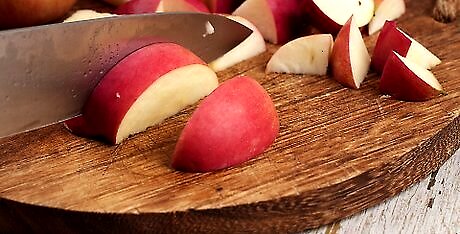
Cut the fruit of your choice into bite-size chunks. Wash your fruit thoroughly under your faucet, then cut off any stems or dark ends using a sharp, serrated knife. If you are candying orange or lemon peel, use a knife or vegetable peeler to remove the outer layer. Then, chop your skin or fruit into ⁄4–⁄2 in (0.64–1.27 cm) chunks or slices. When making candied fruit, the size does not have to be exact. However, using small chunks ensures the fruit is tender. You can also remove any brown spots or rough edges.
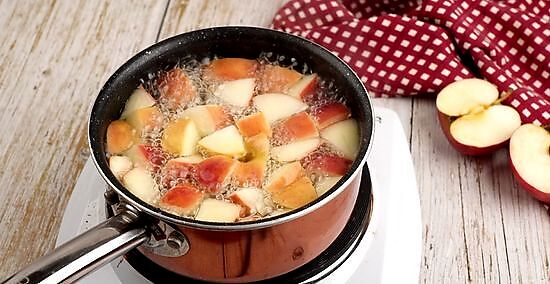
Place the chunks in a pot of water and bring it to a rolling boil. A medium-sized saucepan is a great option, and you can fill it about halfway with water. Make sure all of the candy is completely submerged before you bring it to a boil, so they can cook thoroughly.
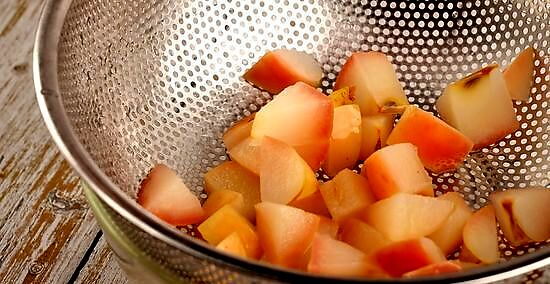
Pour the fruit into a colander once the water boils. You can place the colander in your clean sink as the water is boiling. Once the water is at a rolling boil, you can remove the fruit from the heat. Dump the water and fruit carefully so you don't burn yourself. If you let the fruit soak in boiling water for too long, they can get mushy and soggy.
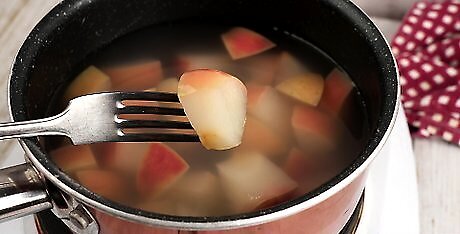
Repeat the blanching process until the fruit chunks are tender. Take a bite of your fruit to check its consistency. If it is still hard, repeat the blanching process again. The amount of times to blanch your fruit depends on the particular fruit you use. In general, you want to repeat this process 2-3 times until the fruit is tender when you bite into it. For instance, cherries and pineapples are often tender enough with 1 round of blanching. Oranges and lemons may need 3 blanching total. Grapefruits generally require 6-8 blanchings.
Adding Simple Syrup
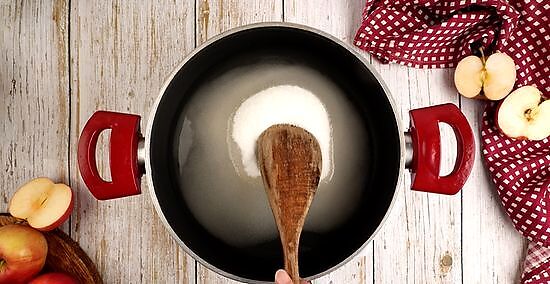
Make simple syrup to use when preserving your fruit. To make your simple syrup, mix 1 cup (250g) of syrup with 1.3 cups (300mL) of water in a medium saucepan. Mix the sugar and water thoroughly, then bring the mixture to a boil. Let the ingredients simmer for 2-3 minutes. After that, your syrup should be clear and thick. You can stir the syrup continuously to help the sugar dissolve.
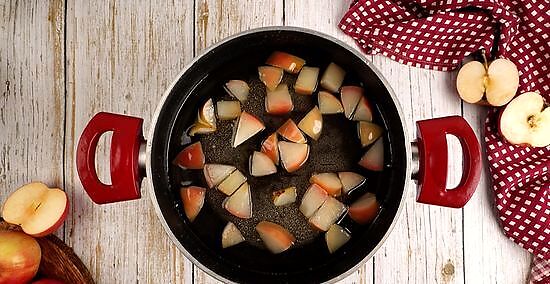
Mix your fruit into your simple syrup. After you make your simple syrup, pour your blanched fruit into the pot. Stir the fruit into the syrup so all sides are completely covered.
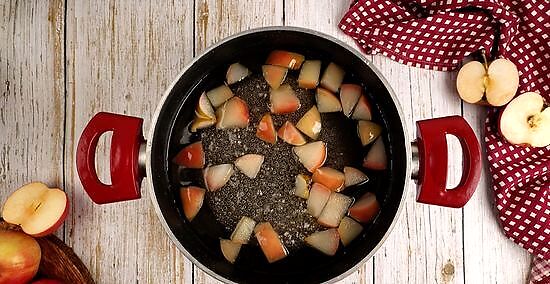
Simmer the fruit for 15-30 minutes until it tastes sweet and tender. Use a low heat setting to warm up your fruit in the simple syrup. The amount of time will depend on the particular fruit you use and the size of your pieces. After 10-15 minutes, take a bite to check the tenderness. If the fruit tastes delicious and you can easily bite through it, it is done. For example, small pieces of lemon rind may only need 10 minutes or so, while large chunks of apples may need 20-30 minutes.
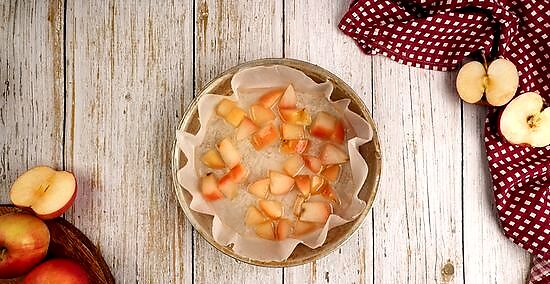
Place the fruit chunks on a piece of parchment paper to dry. Once the fruit simmers for several minutes, turn off the heat and use a wooden spoon to scoop out your fruit. Place the fruit onto a cookie sheet covered in parchment paper. Use the spoon to spread out the pieces so they are flat.
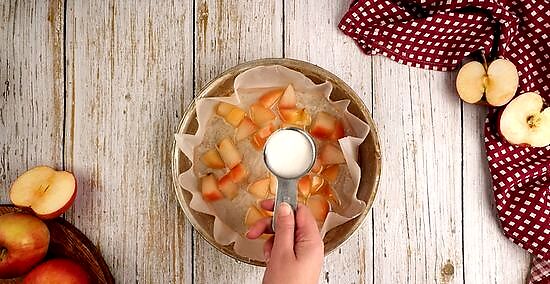
Sprinkle granulated sugar on top of your fruit if you want a garnish. It is common to sprinkle additional granulated sugar on top of your fruit at this step. While it is not required, it adds some additional sweetness and texture to your fruit. Scoop a spoonful of white sugar, and lightly sprinkle it over your fruit. This creates a sugar-coated appearance, which makes the fruit look more presentable if serving it by itself. If you are baking with the candied fruit, you likely do not need to add additional sugar.

Refrigerate the fruit for 24 hours. To finish your fruit, place the sheet of parchment paper into your fridge. Leave the tray in the fridge overnight, and remove it after roughly 24 hours. At this point, your fruit will be hardened and preserved.
Using and Storing the Candied Fruit
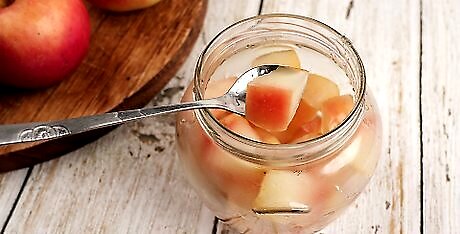
Eat fresh candied fruit within 1-3 days for best results. After about 24 hours in the fridge, your candied fruit will harden up and be ready to eat. If you don’t plan on saving the fruit, eat your sweet treat within a few days after you make it. You can eat the fruit by itself for a delicious snack. Consider mixing your candied fruit with almonds, peanuts, and chocolate chips to make your own decadent trail mix.
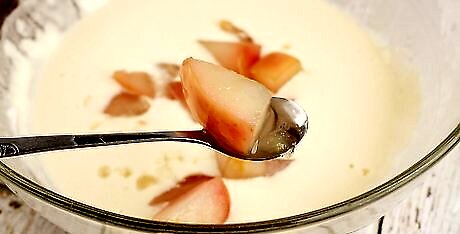
Use the candied fruit in recipes for a sweet treat. Add your candied fruit to fruit cakes, biscotti, and cookie recipes for a fruity touch. Most recipes call for 1/4-1/2 cup (59-118 g) of candied fruit, along with your other ingredients. If using fruit in recipes, make your dish within 1-3 days for best results. You can also refrigerate your candied fruit and use them later on. However, your fruit won’t taste as fresh compared to using them right after making it.
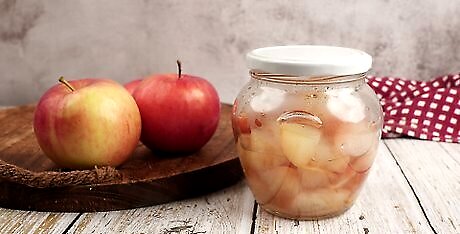
Keep the candied fruit in its syrup in the fridge for 1-3 weeks. Do this if you want to make your candied fruit in advance and use it later. Rather than removing the fruit from the simple syrup, pour both into an airtight container, like a jar or Tupperware. Then, place this in your fridge for up to 3 weeks. The simple syrup will preserve your fruit until you are ready to use it. When you want to use the fruit, scoop it out of the syrup, and let it sit for a few hours. This way, the extra syrup will drip off and you can easily use your fruit.
















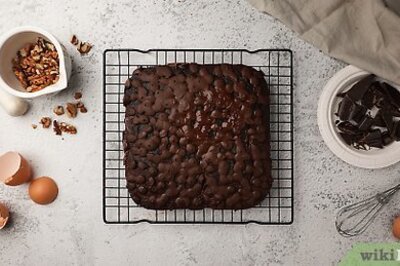
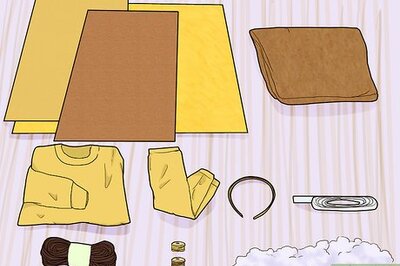


Comments
0 comment